Literacy Specialist Resume Examples

Mar 20, 2025
|
12 min read
Craft your literacy specialist resume with these expert tips and ensure you spell success in every section. Learn how to highlight your skills, experience, and passion for education in a way that reads like a bestseller.
Rated by 348 people
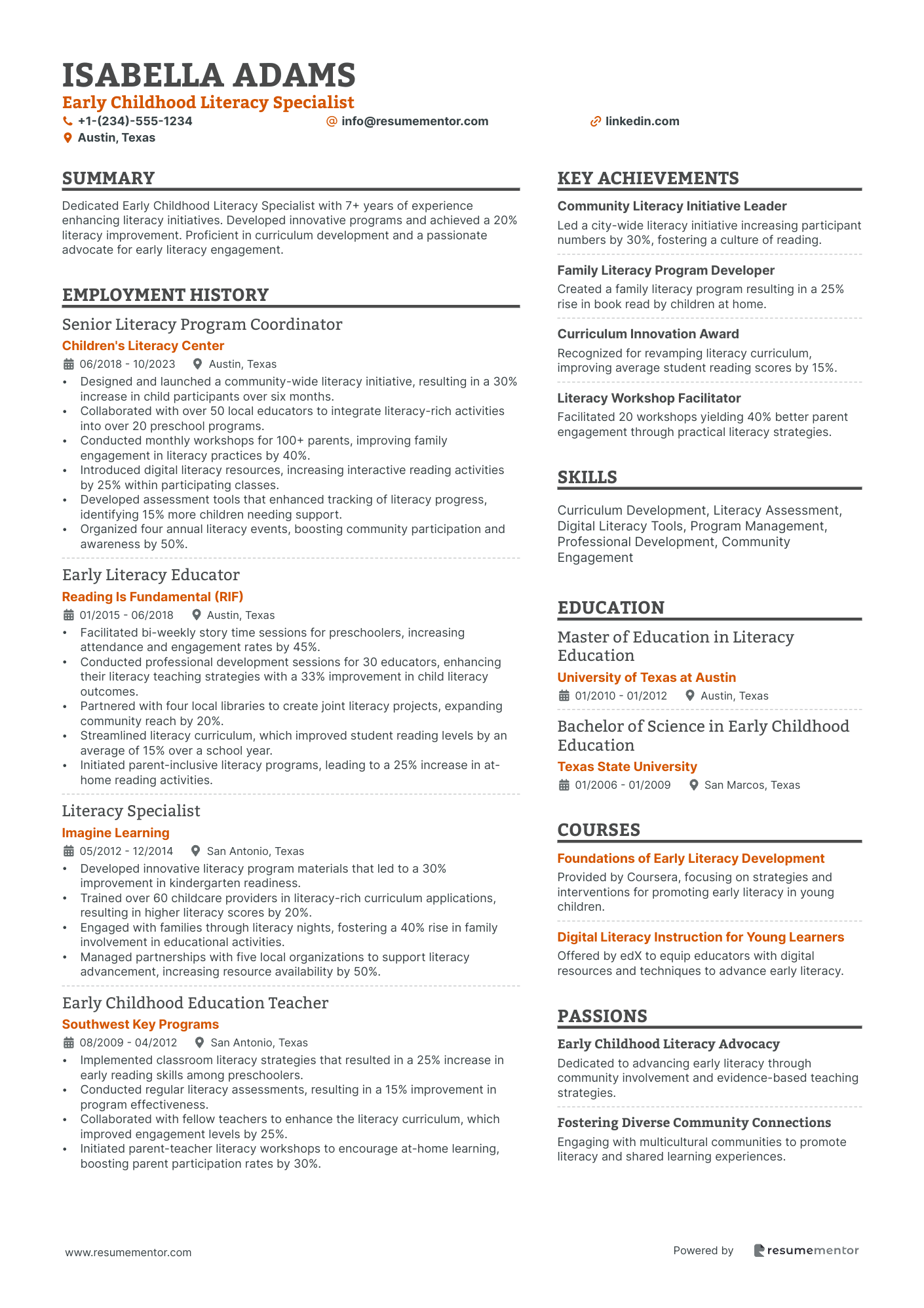
Early Childhood Literacy Specialist
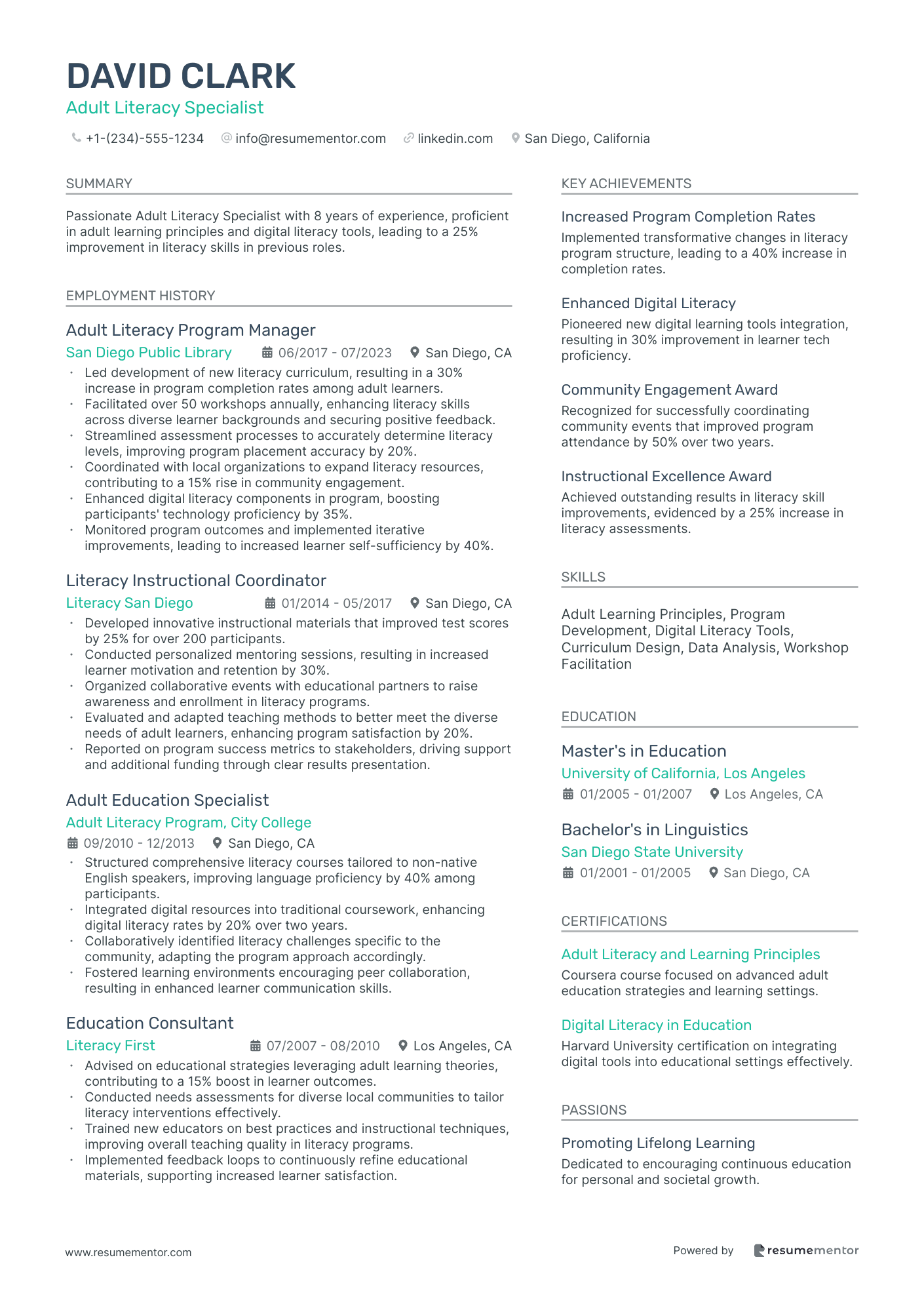
Adult Literacy Specialist
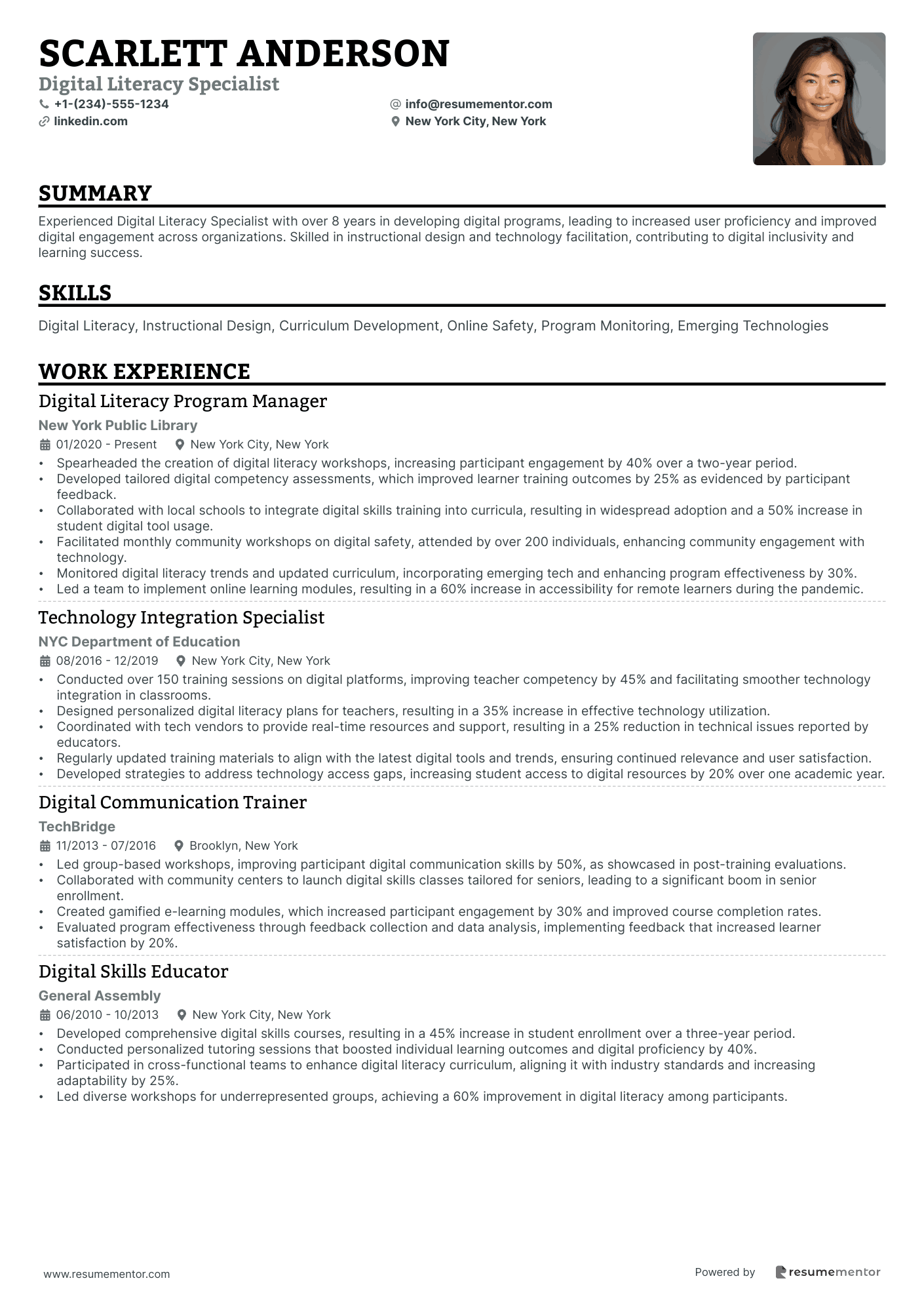
Digital Literacy Specialist
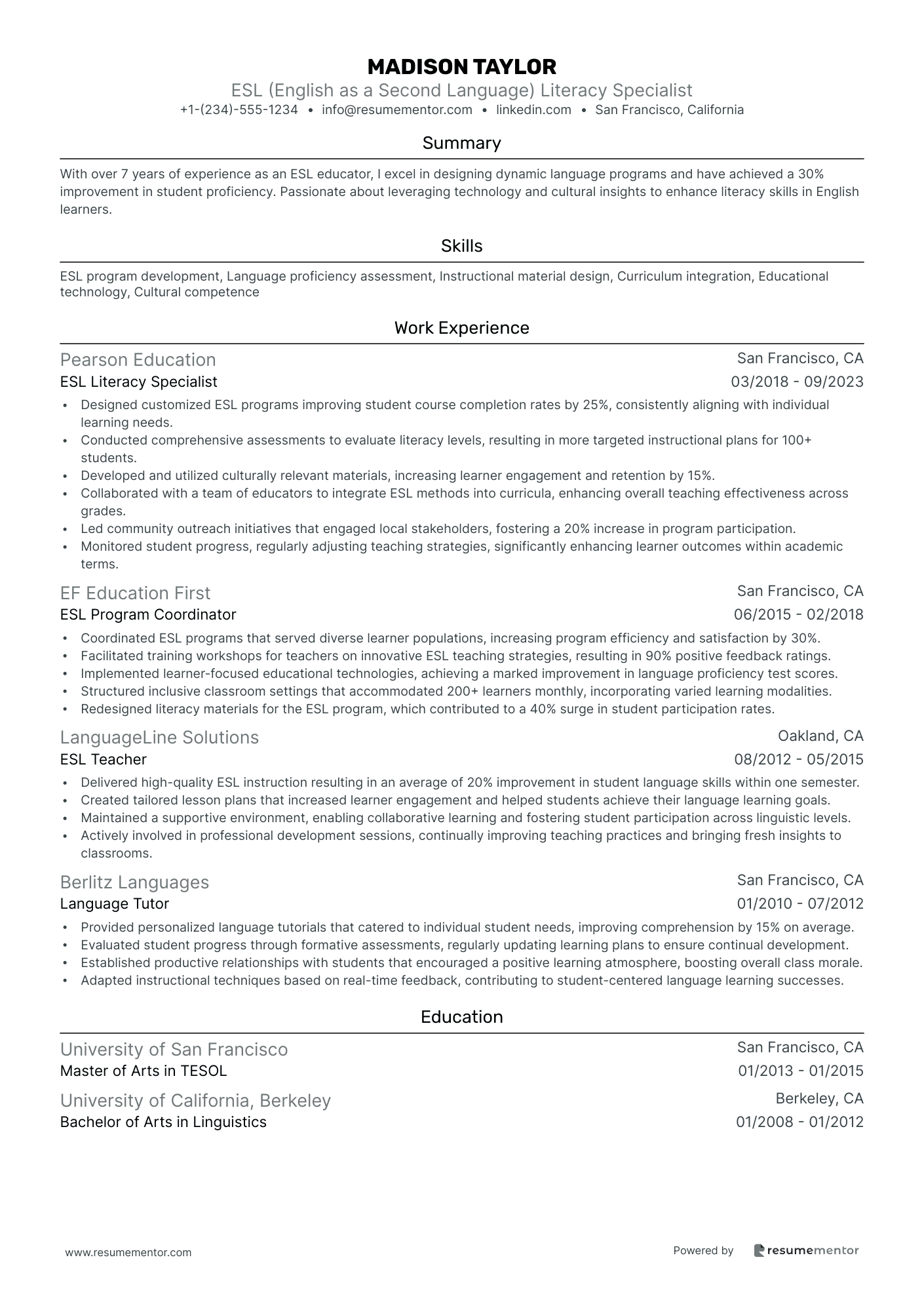
ESL (English as a Second Language) Literacy Specialist
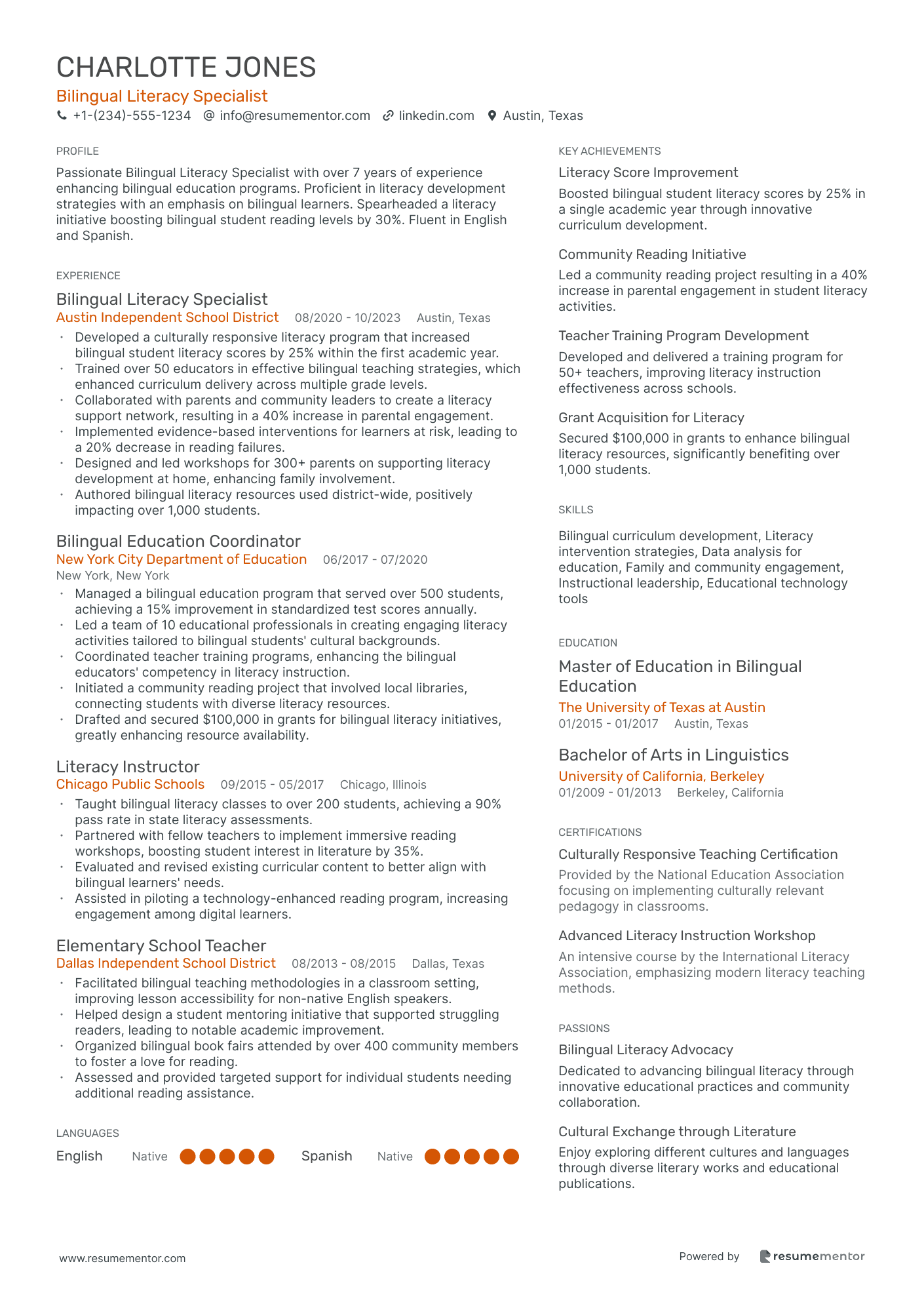
Bilingual Literacy Specialist
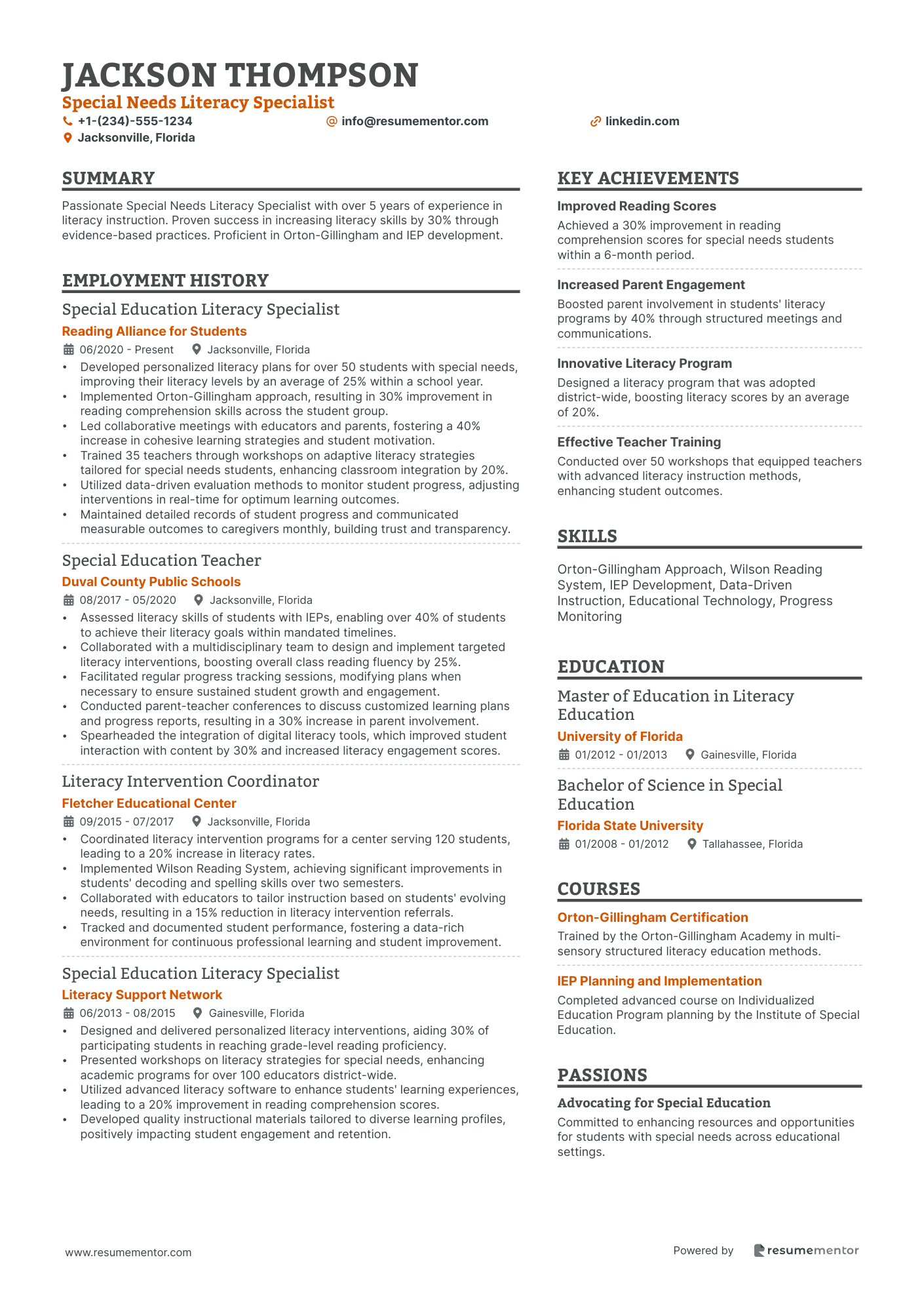
Special Needs Literacy Specialist
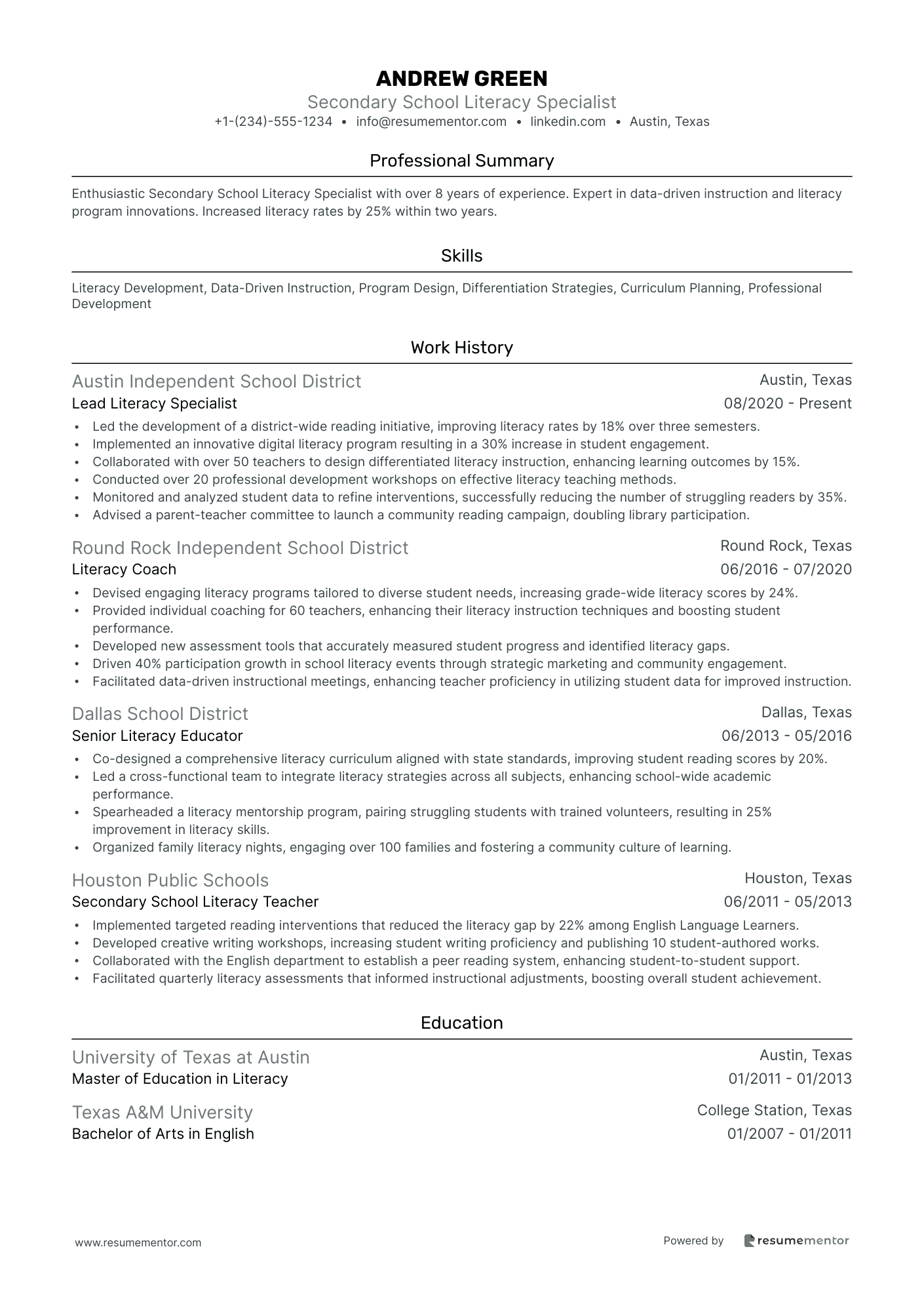
Secondary School Literacy Specialist
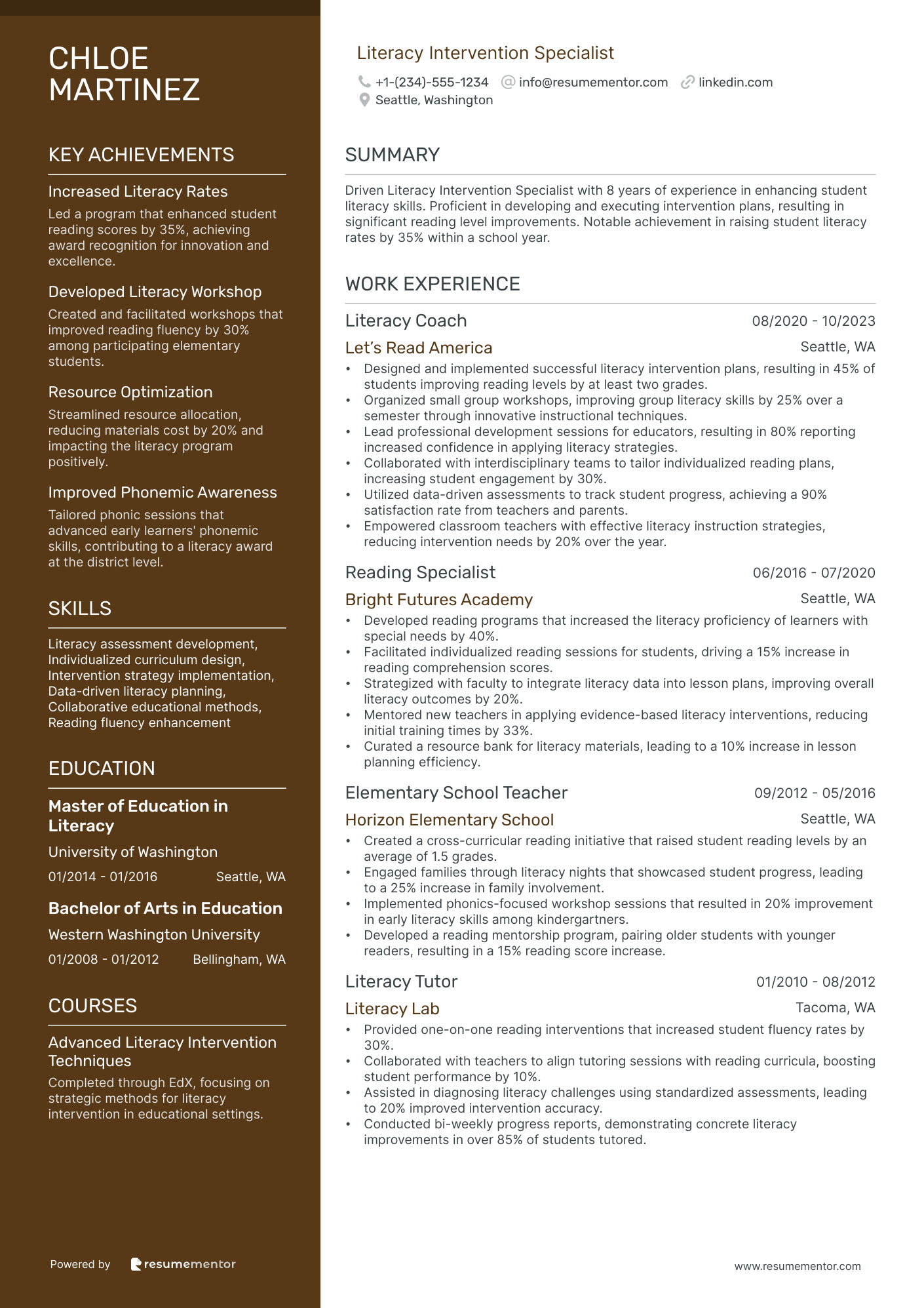
Literacy Intervention Specialist
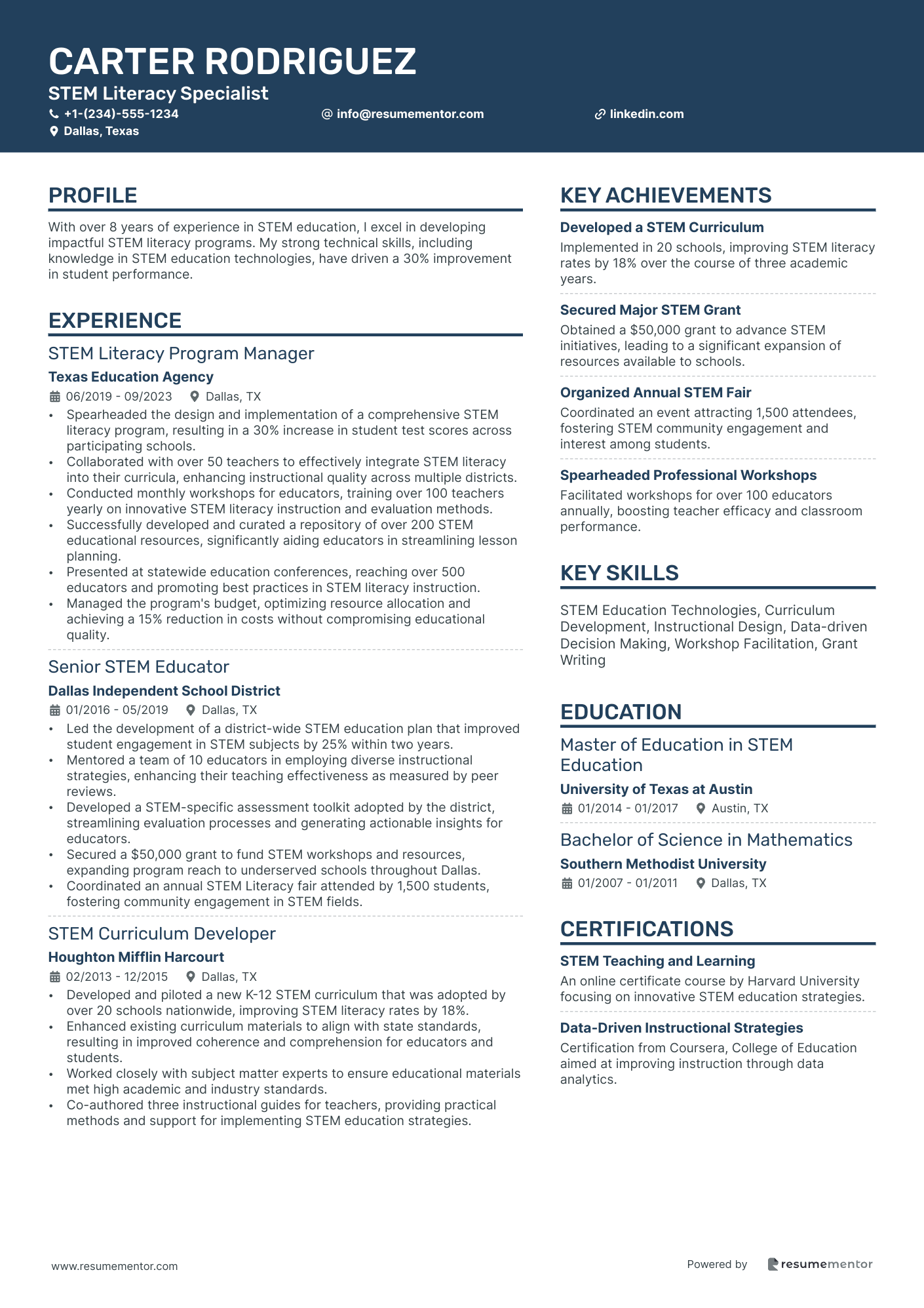
STEM Literacy Specialist
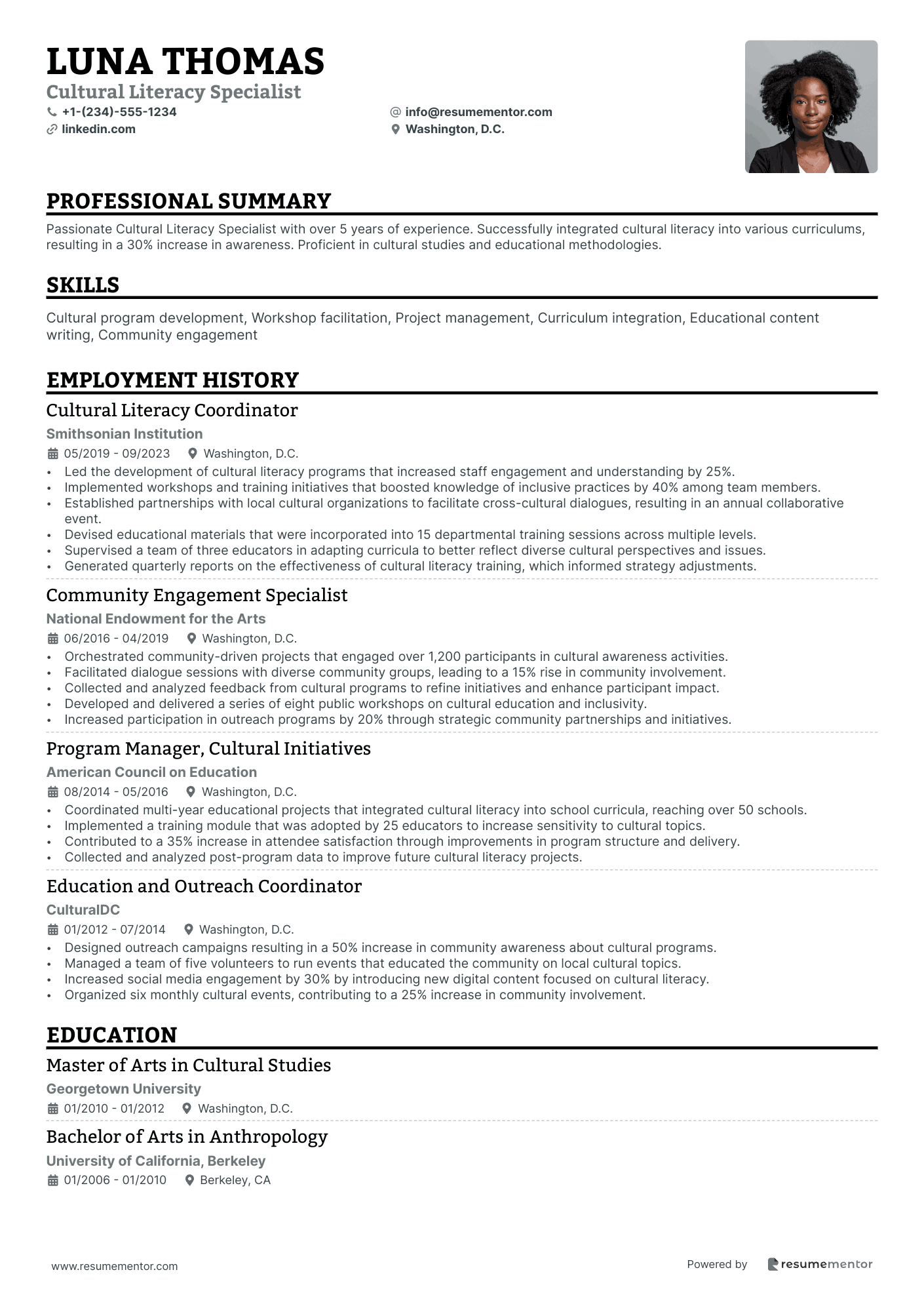
Cultural Literacy Specialist

Early Childhood Literacy Specialist resume sample
- •Designed and launched a community-wide literacy initiative, resulting in a 30% increase in child participants over six months.
- •Collaborated with over 50 local educators to integrate literacy-rich activities into over 20 preschool programs.
- •Conducted monthly workshops for 100+ parents, improving family engagement in literacy practices by 40%.
- •Introduced digital literacy resources, increasing interactive reading activities by 25% within participating classes.
- •Developed assessment tools that enhanced tracking of literacy progress, identifying 15% more children needing support.
- •Organized four annual literacy events, boosting community participation and awareness by 50%.
- •Facilitated bi-weekly story time sessions for preschoolers, increasing attendance and engagement rates by 45%.
- •Conducted professional development sessions for 30 educators, enhancing their literacy teaching strategies with a 33% improvement in child literacy outcomes.
- •Partnered with four local libraries to create joint literacy projects, expanding community reach by 20%.
- •Streamlined literacy curriculum, which improved student reading levels by an average of 15% over a school year.
- •Initiated parent-inclusive literacy programs, leading to a 25% increase in at-home reading activities.
- •Developed innovative literacy program materials that led to a 30% improvement in kindergarten readiness.
- •Trained over 60 childcare providers in literacy-rich curriculum applications, resulting in higher literacy scores by 20%.
- •Engaged with families through literacy nights, fostering a 40% rise in family involvement in educational activities.
- •Managed partnerships with five local organizations to support literacy advancement, increasing resource availability by 50%.
- •Implemented classroom literacy strategies that resulted in a 25% increase in early reading skills among preschoolers.
- •Conducted regular literacy assessments, resulting in a 15% improvement in program effectiveness.
- •Collaborated with fellow teachers to enhance the literacy curriculum, which improved engagement levels by 25%.
- •Initiated parent-teacher literacy workshops to encourage at-home learning, boosting parent participation rates by 30%.
Adult Literacy Specialist resume sample
- •Led development of new literacy curriculum, resulting in a 30% increase in program completion rates among adult learners.
- •Facilitated over 50 workshops annually, enhancing literacy skills across diverse learner backgrounds and securing positive feedback.
- •Streamlined assessment processes to accurately determine literacy levels, improving program placement accuracy by 20%.
- •Coordinated with local organizations to expand literacy resources, contributing to a 15% rise in community engagement.
- •Enhanced digital literacy components in program, boosting participants' technology proficiency by 35%.
- •Monitored program outcomes and implemented iterative improvements, leading to increased learner self-sufficiency by 40%.
- •Developed innovative instructional materials that improved test scores by 25% for over 200 participants.
- •Conducted personalized mentoring sessions, resulting in increased learner motivation and retention by 30%.
- •Organized collaborative events with educational partners to raise awareness and enrollment in literacy programs.
- •Evaluated and adapted teaching methods to better meet the diverse needs of adult learners, enhancing program satisfaction by 20%.
- •Reported on program success metrics to stakeholders, driving support and additional funding through clear results presentation.
- •Structured comprehensive literacy courses tailored to non-native English speakers, improving language proficiency by 40% among participants.
- •Integrated digital resources into traditional coursework, enhancing digital literacy rates by 20% over two years.
- •Collaboratively identified literacy challenges specific to the community, adapting the program approach accordingly.
- •Fostered learning environments encouraging peer collaboration, resulting in enhanced learner communication skills.
- •Advised on educational strategies leveraging adult learning theories, contributing to a 15% boost in learner outcomes.
- •Conducted needs assessments for diverse local communities to tailor literacy interventions effectively.
- •Trained new educators on best practices and instructional techniques, improving overall teaching quality in literacy programs.
- •Implemented feedback loops to continuously refine educational materials, supporting increased learner satisfaction.
Digital Literacy Specialist resume sample
- •Spearheaded the creation of digital literacy workshops, increasing participant engagement by 40% over a two-year period.
- •Developed tailored digital competency assessments, which improved learner training outcomes by 25% as evidenced by participant feedback.
- •Collaborated with local schools to integrate digital skills training into curricula, resulting in widespread adoption and a 50% increase in student digital tool usage.
- •Facilitated monthly community workshops on digital safety, attended by over 200 individuals, enhancing community engagement with technology.
- •Monitored digital literacy trends and updated curriculum, incorporating emerging tech and enhancing program effectiveness by 30%.
- •Led a team to implement online learning modules, resulting in a 60% increase in accessibility for remote learners during the pandemic.
- •Conducted over 150 training sessions on digital platforms, improving teacher competency by 45% and facilitating smoother technology integration in classrooms.
- •Designed personalized digital literacy plans for teachers, resulting in a 35% increase in effective technology utilization.
- •Coordinated with tech vendors to provide real-time resources and support, resulting in a 25% reduction in technical issues reported by educators.
- •Regularly updated training materials to align with the latest digital tools and trends, ensuring continued relevance and user satisfaction.
- •Developed strategies to address technology access gaps, increasing student access to digital resources by 20% over one academic year.
- •Led group-based workshops, improving participant digital communication skills by 50%, as showcased in post-training evaluations.
- •Collaborated with community centers to launch digital skills classes tailored for seniors, leading to a significant boom in senior enrollment.
- •Created gamified e-learning modules, which increased participant engagement by 30% and improved course completion rates.
- •Evaluated program effectiveness through feedback collection and data analysis, implementing feedback that increased learner satisfaction by 20%.
- •Developed comprehensive digital skills courses, resulting in a 45% increase in student enrollment over a three-year period.
- •Conducted personalized tutoring sessions that boosted individual learning outcomes and digital proficiency by 40%.
- •Participated in cross-functional teams to enhance digital literacy curriculum, aligning it with industry standards and increasing adaptability by 25%.
- •Led diverse workshops for underrepresented groups, achieving a 60% improvement in digital literacy among participants.
ESL (English as a Second Language) Literacy Specialist resume sample
- •Designed customized ESL programs improving student course completion rates by 25%, consistently aligning with individual learning needs.
- •Conducted comprehensive assessments to evaluate literacy levels, resulting in more targeted instructional plans for 100+ students.
- •Developed and utilized culturally relevant materials, increasing learner engagement and retention by 15%.
- •Collaborated with a team of educators to integrate ESL methods into curricula, enhancing overall teaching effectiveness across grades.
- •Led community outreach initiatives that engaged local stakeholders, fostering a 20% increase in program participation.
- •Monitored student progress, regularly adjusting teaching strategies, significantly enhancing learner outcomes within academic terms.
- •Coordinated ESL programs that served diverse learner populations, increasing program efficiency and satisfaction by 30%.
- •Facilitated training workshops for teachers on innovative ESL teaching strategies, resulting in 90% positive feedback ratings.
- •Implemented learner-focused educational technologies, achieving a marked improvement in language proficiency test scores.
- •Structured inclusive classroom settings that accommodated 200+ learners monthly, incorporating varied learning modalities.
- •Redesigned literacy materials for the ESL program, which contributed to a 40% surge in student participation rates.
- •Delivered high-quality ESL instruction resulting in an average of 20% improvement in student language skills within one semester.
- •Created tailored lesson plans that increased learner engagement and helped students achieve their language learning goals.
- •Maintained a supportive environment, enabling collaborative learning and fostering student participation across linguistic levels.
- •Actively involved in professional development sessions, continually improving teaching practices and bringing fresh insights to classrooms.
- •Provided personalized language tutorials that catered to individual student needs, improving comprehension by 15% on average.
- •Evaluated student progress through formative assessments, regularly updating learning plans to ensure continual development.
- •Established productive relationships with students that encouraged a positive learning atmosphere, boosting overall class morale.
- •Adapted instructional techniques based on real-time feedback, contributing to student-centered language learning successes.
Bilingual Literacy Specialist resume sample
- •Developed a culturally responsive literacy program that increased bilingual student literacy scores by 25% within the first academic year.
- •Trained over 50 educators in effective bilingual teaching strategies, which enhanced curriculum delivery across multiple grade levels.
- •Collaborated with parents and community leaders to create a literacy support network, resulting in a 40% increase in parental engagement.
- •Implemented evidence-based interventions for learners at risk, leading to a 20% decrease in reading failures.
- •Designed and led workshops for 300+ parents on supporting literacy development at home, enhancing family involvement.
- •Authored bilingual literacy resources used district-wide, positively impacting over 1,000 students.
- •Managed a bilingual education program that served over 500 students, achieving a 15% improvement in standardized test scores annually.
- •Led a team of 10 educational professionals in creating engaging literacy activities tailored to bilingual students' cultural backgrounds.
- •Coordinated teacher training programs, enhancing the bilingual educators' competency in literacy instruction.
- •Initiated a community reading project that involved local libraries, connecting students with diverse literacy resources.
- •Drafted and secured $100,000 in grants for bilingual literacy initiatives, greatly enhancing resource availability.
- •Taught bilingual literacy classes to over 200 students, achieving a 90% pass rate in state literacy assessments.
- •Partnered with fellow teachers to implement immersive reading workshops, boosting student interest in literature by 35%.
- •Evaluated and revised existing curricular content to better align with bilingual learners' needs.
- •Assisted in piloting a technology-enhanced reading program, increasing engagement among digital learners.
- •Facilitated bilingual teaching methodologies in a classroom setting, improving lesson accessibility for non-native English speakers.
- •Helped design a student mentoring initiative that supported struggling readers, leading to notable academic improvement.
- •Organized bilingual book fairs attended by over 400 community members to foster a love for reading.
- •Assessed and provided targeted support for individual students needing additional reading assistance.
Special Needs Literacy Specialist resume sample
- •Developed personalized literacy plans for over 50 students with special needs, improving their literacy levels by an average of 25% within a school year.
- •Implemented Orton-Gillingham approach, resulting in 30% improvement in reading comprehension skills across the student group.
- •Led collaborative meetings with educators and parents, fostering a 40% increase in cohesive learning strategies and student motivation.
- •Trained 35 teachers through workshops on adaptive literacy strategies tailored for special needs students, enhancing classroom integration by 20%.
- •Utilized data-driven evaluation methods to monitor student progress, adjusting interventions in real-time for optimum learning outcomes.
- •Maintained detailed records of student progress and communicated measurable outcomes to caregivers monthly, building trust and transparency.
- •Assessed literacy skills of students with IEPs, enabling over 40% of students to achieve their literacy goals within mandated timelines.
- •Collaborated with a multidisciplinary team to design and implement targeted literacy interventions, boosting overall class reading fluency by 25%.
- •Facilitated regular progress tracking sessions, modifying plans when necessary to ensure sustained student growth and engagement.
- •Conducted parent-teacher conferences to discuss customized learning plans and progress reports, resulting in a 30% increase in parent involvement.
- •Spearheaded the integration of digital literacy tools, which improved student interaction with content by 30% and increased literacy engagement scores.
- •Coordinated literacy intervention programs for a center serving 120 students, leading to a 20% increase in literacy rates.
- •Implemented Wilson Reading System, achieving significant improvements in students' decoding and spelling skills over two semesters.
- •Collaborated with educators to tailor instruction based on students' evolving needs, resulting in a 15% reduction in literacy intervention referrals.
- •Tracked and documented student performance, fostering a data-rich environment for continuous professional learning and student improvement.
- •Designed and delivered personalized literacy interventions, aiding 30% of participating students in reaching grade-level reading proficiency.
- •Presented workshops on literacy strategies for special needs, enhancing academic programs for over 100 educators district-wide.
- •Utilized advanced literacy software to enhance students' learning experiences, leading to a 20% improvement in reading comprehension scores.
- •Developed quality instructional materials tailored to diverse learning profiles, positively impacting student engagement and retention.
Secondary School Literacy Specialist resume sample
- •Led the development of a district-wide reading initiative, improving literacy rates by 18% over three semesters.
- •Implemented an innovative digital literacy program resulting in a 30% increase in student engagement.
- •Collaborated with over 50 teachers to design differentiated literacy instruction, enhancing learning outcomes by 15%.
- •Conducted over 20 professional development workshops on effective literacy teaching methods.
- •Monitored and analyzed student data to refine interventions, successfully reducing the number of struggling readers by 35%.
- •Advised a parent-teacher committee to launch a community reading campaign, doubling library participation.
- •Devised engaging literacy programs tailored to diverse student needs, increasing grade-wide literacy scores by 24%.
- •Provided individual coaching for 60 teachers, enhancing their literacy instruction techniques and boosting student performance.
- •Developed new assessment tools that accurately measured student progress and identified literacy gaps.
- •Driven 40% participation growth in school literacy events through strategic marketing and community engagement.
- •Facilitated data-driven instructional meetings, enhancing teacher proficiency in utilizing student data for improved instruction.
- •Co-designed a comprehensive literacy curriculum aligned with state standards, improving student reading scores by 20%.
- •Led a cross-functional team to integrate literacy strategies across all subjects, enhancing school-wide academic performance.
- •Spearheaded a literacy mentorship program, pairing struggling students with trained volunteers, resulting in 25% improvement in literacy skills.
- •Organized family literacy nights, engaging over 100 families and fostering a community culture of learning.
- •Implemented targeted reading interventions that reduced the literacy gap by 22% among English Language Learners.
- •Developed creative writing workshops, increasing student writing proficiency and publishing 10 student-authored works.
- •Collaborated with the English department to establish a peer reading system, enhancing student-to-student support.
- •Facilitated quarterly literacy assessments that informed instructional adjustments, boosting overall student achievement.
Literacy Intervention Specialist resume sample
- •Designed and implemented successful literacy intervention plans, resulting in 45% of students improving reading levels by at least two grades.
- •Organized small group workshops, improving group literacy skills by 25% over a semester through innovative instructional techniques.
- •Lead professional development sessions for educators, resulting in 80% reporting increased confidence in applying literacy strategies.
- •Collaborated with interdisciplinary teams to tailor individualized reading plans, increasing student engagement by 30%.
- •Utilized data-driven assessments to track student progress, achieving a 90% satisfaction rate from teachers and parents.
- •Empowered classroom teachers with effective literacy instruction strategies, reducing intervention needs by 20% over the year.
- •Developed reading programs that increased the literacy proficiency of learners with special needs by 40%.
- •Facilitated individualized reading sessions for students, driving a 15% increase in reading comprehension scores.
- •Strategized with faculty to integrate literacy data into lesson plans, improving overall literacy outcomes by 20%.
- •Mentored new teachers in applying evidence-based literacy interventions, reducing initial training times by 33%.
- •Curated a resource bank for literacy materials, leading to a 10% increase in lesson planning efficiency.
- •Created a cross-curricular reading initiative that raised student reading levels by an average of 1.5 grades.
- •Engaged families through literacy nights that showcased student progress, leading to a 25% increase in family involvement.
- •Implemented phonics-focused workshop sessions that resulted in 20% improvement in early literacy skills among kindergartners.
- •Developed a reading mentorship program, pairing older students with younger readers, resulting in a 15% reading score increase.
- •Provided one-on-one reading interventions that increased student fluency rates by 30%.
- •Collaborated with teachers to align tutoring sessions with reading curricula, boosting student performance by 10%.
- •Assisted in diagnosing literacy challenges using standardized assessments, leading to 20% improved intervention accuracy.
- •Conducted bi-weekly progress reports, demonstrating concrete literacy improvements in over 85% of students tutored.
STEM Literacy Specialist resume sample
- •Spearheaded the design and implementation of a comprehensive STEM literacy program, resulting in a 30% increase in student test scores across participating schools.
- •Collaborated with over 50 teachers to effectively integrate STEM literacy into their curricula, enhancing instructional quality across multiple districts.
- •Conducted monthly workshops for educators, training over 100 teachers yearly on innovative STEM literacy instruction and evaluation methods.
- •Successfully developed and curated a repository of over 200 STEM educational resources, significantly aiding educators in streamlining lesson planning.
- •Presented at statewide education conferences, reaching over 500 educators and promoting best practices in STEM literacy instruction.
- •Managed the program's budget, optimizing resource allocation and achieving a 15% reduction in costs without compromising educational quality.
- •Led the development of a district-wide STEM education plan that improved student engagement in STEM subjects by 25% within two years.
- •Mentored a team of 10 educators in employing diverse instructional strategies, enhancing their teaching effectiveness as measured by peer reviews.
- •Developed a STEM-specific assessment toolkit adopted by the district, streamlining evaluation processes and generating actionable insights for educators.
- •Secured a $50,000 grant to fund STEM workshops and resources, expanding program reach to underserved schools throughout Dallas.
- •Coordinated an annual STEM Literacy fair attended by 1,500 students, fostering community engagement in STEM fields.
- •Developed and piloted a new K-12 STEM curriculum that was adopted by over 20 schools nationwide, improving STEM literacy rates by 18%.
- •Enhanced existing curriculum materials to align with state standards, resulting in improved coherence and comprehension for educators and students.
- •Worked closely with subject matter experts to ensure educational materials met high academic and industry standards.
- •Co-authored three instructional guides for teachers, providing practical methods and support for implementing STEM education strategies.
- •Advised educational institutions on integrating technology into STEM teaching, increasing student engagement through interactive learning tools by 20%.
- •Facilitated over 25 professional development sessions on innovative STEM teaching methods, enhancing teacher effectiveness and confidence.
- •Developed assessment metrics that aligned with educational goals, improving the measurement of student progress by 15%.
- •Built relationships with community organizations to support STEM initiatives, leading to increased local participation and resources for educational programs.
Cultural Literacy Specialist resume sample
- •Led the development of cultural literacy programs that increased staff engagement and understanding by 25%.
- •Implemented workshops and training initiatives that boosted knowledge of inclusive practices by 40% among team members.
- •Established partnerships with local cultural organizations to facilitate cross-cultural dialogues, resulting in an annual collaborative event.
- •Devised educational materials that were incorporated into 15 departmental training sessions across multiple levels.
- •Supervised a team of three educators in adapting curricula to better reflect diverse cultural perspectives and issues.
- •Generated quarterly reports on the effectiveness of cultural literacy training, which informed strategy adjustments.
- •Orchestrated community-driven projects that engaged over 1,200 participants in cultural awareness activities.
- •Facilitated dialogue sessions with diverse community groups, leading to a 15% rise in community involvement.
- •Collected and analyzed feedback from cultural programs to refine initiatives and enhance participant impact.
- •Developed and delivered a series of eight public workshops on cultural education and inclusivity.
- •Increased participation in outreach programs by 20% through strategic community partnerships and initiatives.
- •Coordinated multi-year educational projects that integrated cultural literacy into school curricula, reaching over 50 schools.
- •Implemented a training module that was adopted by 25 educators to increase sensitivity to cultural topics.
- •Contributed to a 35% increase in attendee satisfaction through improvements in program structure and delivery.
- •Collected and analyzed post-program data to improve future cultural literacy projects.
- •Designed outreach campaigns resulting in a 50% increase in community awareness about cultural programs.
- •Managed a team of five volunteers to run events that educated the community on local cultural topics.
- •Increased social media engagement by 30% by introducing new digital content focused on cultural literacy.
- •Organized six monthly cultural events, contributing to a 25% increase in community involvement.
Crafting a resume as a literacy specialist is like tailoring a bespoke suit—every element must align perfectly with the profession’s demands. Your ability to design educational paths and spark a love for reading is invaluable, so a weak resume shouldn’t hold you back. In a competitive job market, having a strong, clear, and concise resume ensures that opportunities don’t slip away unnoticed.
Showcasing your skills in curriculum development and teaching strategies on paper can be a hurdle. Capturing your expertise in literacy intervention or quantifying the impact of your work might feel challenging. This is where a solid template can provide guidance. With the right resume templates, you can easily organize your experience and skills in a reader-friendly format.
By using a structured template, you save time and eliminate design-related guesswork. This lets you focus on personalizing the content to highlight your literacy expertise effectively. In this guide, you'll find strategies to eloquently present your qualifications and make your resume stand out. Ultimately, it’s about crafting a document that truly reflects the unique value you bring to the world of literacy.
Key Takeaways
- When writing a teacher resume, it's crucial to tailor it specifically to the role you're applying for, focusing on relevant education, skills, and certifications.
- Using a structured and reader-friendly resume template can help effectively organize your experiences and skills, making them easily accessible to employers.
- Emphasize instructional competencies, curriculum development, collaboration skills, and impact in literacy education to attract recruiters' attention.
- Choosing the right resume format—chronological, functional, or combination—depends on your career path and the message you want to convey.
- Incorporating quantifiable achievements and specific action verbs in the experience section enhances your document's effectiveness and appeal.
What to focus on when writing your literacy specialist resume
A literacy specialist resume should convey your deep expertise in literacy education and demonstrate your ability to enhance reading skills among diverse student groups. It's important for recruiters to see your instructional competencies along with your experience in curriculum development. Make sure to shine a light on your collaboration skills, illustrating how you work closely with teachers and other educators to improve literacy outcomes.
How to structure your literacy specialist resume
- Contact Information — First impressions matter, so at the very top of your resume, make sure your contact information is clearly presented. Include your full name, phone number, email address, and LinkedIn profile to make it easy for recruiters to reach out. This section should be straightforward but up-to-date, as it sets the stage for more detailed sections about your qualifications.
- Professional Summary — This is a snapshot of your career and a chance to quickly grab the recruiter's attention. Your summary should encapsulate your experience in literacy education, share specific successes in reading programs, and express your passion for teaching literacy skills. Think of it as your personal brand statement that leaves a memorable impression and entices the recruiter to read further.
- Education — In this section, you need to clearly list your academic credentials and should highlight what makes you qualified for the role. Start with the most advanced degrees and include the institution names and graduation dates. Mention any specific coursework or certifications that enhance your candidacy, such as a Reading Specialist certification, which is highly valuable in this field.
- Experience — Your work history should paint a picture of your capacity as a literacy specialist. Focus on roles that directly relate to literacy education and emphasize your achievements like improving reading levels or implementing successful literacy programs. This section is your opportunity to demonstrate real-world impact and how you've applied your skills in previous positions.
- Skills — Make this section a focused inventory of what you offer. List targeted skills such as literacy assessment, curriculum development, differentiated instruction, and collaborative work with educators. These skills need to align with the job description and should communicate your preparedness for the demands of the role.
- Professional Development — Continuing education is important in an ever-evolving field like literacy education. Mention any workshops, seminars, or courses you've attended that are relevant to literacy education. This demonstrates not just your commitment to your own growth but also to keeping your skills and knowledge current for the benefit of the students you'll serve.
Optional sections like awards, publications, or volunteer work can further enhance your resume by showcasing your dedication to literacy and community involvement. Understanding each section's purpose and how to effectively communicate your strengths is crucial. Next, we'll cover the resume format and explore each of these sections more in-depth.
Which resume format to choose
Creating an effective resume as a literacy specialist begins with choosing the right format to highlight your expertise in education. A chronological format is ideal if you've followed a straightforward career path, as it naturally showcases your work history and progress over time. On the other hand, if you're shifting careers or have experienced employment gaps, a functional format lets you emphasize the skills and achievements relevant to your new career goals. For those with both extensive experience and specific skills to feature, a combination format offers a balanced approach that captures the full scope of your qualifications.
When selecting fonts, consider how they contribute to the overall presentation of your resume. Opt for modern choices like Rubik, Lato, and Montserrat, which convey a clean and professional look. These fonts maintain readability, a pivotal aspect in a literacy-focused role, ensuring your document is accessible and appealing.
Always save your resume as a PDF to maintain formatting integrity. This file type preserves your layout across different devices and guarantees that all readers view your resume as intended. Consistency and reliability are crucial for making a professional impression, which is vital in a competitive job market.
Finally, keep your margins at one inch on all sides. Proper margins enhance readability, allowing for a harmonious balance of text and whitespace. This prevents your resume from appearing cluttered and ensures your information is easy to navigate. Visual clarity is key in helping hiring managers quickly identify your strengths, making a positive impact as a literacy specialist eager to explore new opportunities.
How to write a quantifiable resume experience section
An effective experience section on your literacy specialist resume seamlessly showcases your role in advancing literacy education and demonstrates your impactful contributions. It’s the part of your resume that vividly illustrates your ability to improve reading programs and literacy outcomes. Start with your most recent roles, arranging your experiences in reverse chronological order. This structure ensures that relevant and recent jobs get highlighted, focusing primarily on those connected to literacy or education from the past 10-15 years.
Tailoring your resume to each job ad is crucial as it aligns your experience with the specific needs of prospective employers. Highlight tasks and accomplishments that reflect the requirements of the job description. Use dynamic verbs like "enhanced," "initiated," "boosted," and "collaborated" to convey your active role and influence. Providing concrete numbers or percentages helps quantify your achievements, offering clear and persuasive evidence of your impact.
Take a look at this example:
- •Increased student reading comprehension scores by 25% with focused interventions and customized teaching.
- •Initiated a district-wide literacy curriculum, uplifting student engagement in literacy by 30%.
- •Trained more than 50 teachers in effective literacy strategies, improving classroom literacy rates.
- •Collaborated with staff to develop personalized educational plans, leading to a 40% rise in at-risk students' performance.
This experience section is cohesive and compelling because it’s well-organized and begins with your most relevant, up-to-date roles, directly aligning with the core competencies of a literacy specialist. Each bullet point builds on the last, using quantifiable metrics to solidify the impact you've had on literacy programs, from increasing comprehension scores to enhancing teacher training and boosting student performance. By weaving specific action verbs throughout, the section remains dynamic and engaging, all while being tailored to highlight your strengths that meet the job ad’s requirements, effectively positioning you as a strong candidate.
Training and Development Focused resume experience section
A literacy-focused resume experience section should clearly demonstrate your skills and achievements in literacy education and training. Begin by identifying your role and the impact you made, sharing specific outcomes like improved literacy rates or successful programs you developed. Detail your responsibilities and ensure each bullet point highlights a particular skill or accomplishment relevant to literacy training and development.
Showcase your expertise in designing and leading literacy programs by emphasizing your teamwork, leadership, and innovation. Discuss unique programs you introduced and the positive changes they brought, reinforcing how you enhanced literacy outcomes in the schools or institutions you served. By doing this, potential employers can see the valuable contributions you've made and the depth of your skills.
Literacy Specialist
Greenwood District School System
June 2018 - Present
- Led the development of a district-wide literacy curriculum, which increased student literacy scores by 15%.
- Coordinated workshops and professional development sessions for over 200 educators to enhance teaching strategies.
- Implemented an early literacy intervention program that improved reading skills among struggling students.
- Collaborated with a team to create digital resources that support diverse learning needs and expanded access to literacy materials.
Technology-Focused resume experience section
A technology-focused literacy specialist resume experience section should highlight how you've adeptly integrated technology into the world of literacy education. It's important to focus not just on your tasks, but on your achievements that showcase a tech-driven approach to teaching and learning. By detailing how you have brought digital tools into the classroom, you emphasize how these innovations have made lessons more engaging and, in turn, helped students improve their reading and writing skills. Tangible results, such as increased student engagement or higher literacy rates due to tech initiatives, greatly enhance your profile.
Start by listing your job title and where you worked, alongside the timeline of your role. Aim to connect each of these elements with an overarching narrative about how you effectively made use of technology in literacy education. As you use bullet points to outline your contributions and successes, highlight specific digital tools, programs, or methods. This approach showcases your ability to creatively and effectively merge technology with literacy instruction, demonstrating both innovation and measurable impact.
Literacy Specialist
ABC Elementary School
June 2020 - Present
- Led the integration of interactive reading platforms in the classroom, boosting student reading engagement by 30%.
- Developed a digital resource database to aid literacy improvement, cutting down resource search time by 20%.
- Trained 15 staff members to use educational technologies for literacy, enhancing teaching methods and student excitement.
- Partnered with IT specialists to create a virtual book club platform, fostering a reading culture beyond the classroom.
Achievement-Focused resume experience section
A literacy-focused resume experience section should clearly highlight your key accomplishments and their positive impacts. Start by considering the significant outcomes you’ve achieved and how these have benefited students or the school community. Discuss specific initiatives or programs you've led, and emphasize measurable improvements in literacy rates or student engagement. Use engaging action verbs to describe your contributions, ensuring each point centers on results rather than just listing tasks.
To maintain clarity and specificity, mention any creative teaching methods or tools that brought about change. Demonstrate your leadership skills by including instances where you mentored teachers or led professional development workshops. Tailor your achievements to the job you’re applying for, focusing on the skills and results most relevant to the employer’s needs.
Literacy Specialist
Greenwood Elementary School
2018 - 2023
- Implemented a reading intervention program that boosted student reading scores by 20% over two years.
- Trained over 50 teachers in literacy strategies, which enhanced classroom engagement across grades.
- Organized a family literacy night, resulting in a 40% increase in parent participation in reading activities.
- Collaborated with the local library for summer reading initiatives, leading to a 30% rise in library card sign-ups.
Skills-Focused resume experience section
A skills-focused literacy specialist resume experience section should highlight the essential skills required for the job, such as assessment, intervention strategies, collaboration, and instructional support. Begin by illustrating how you've effectively utilized these skills in previous roles with specific examples. Emphasize your contributions and achievements to showcase the impact you've made in each position, and use action verbs to make these responsibilities stand out. Craft each bullet point carefully, ensuring it is both concise and informative.
To clearly convey your accomplishments, start each entry with an action verb and quantify your successes whenever possible, such as highlighting improvements in reading scores. This not only showcases your effectiveness but also demonstrates successful collaboration with educators. Use straightforward language to keep the content accessible and relevant to the role you’re pursuing. Tailor your descriptions to each job application, focusing on the skills and experiences most pertinent to that specific role.
Literacy Specialist
Greenwood Elementary School
June 2018 - Present
- Implemented targeted reading programs, boosting student reading levels by 20%.
- Worked with 15 teachers to weave literacy instruction into the curriculum, sparking a school-wide reading movement.
- Tailored learning plans for students facing reading hurdles, improving their comprehension skills.
- Led workshops for parents to nurture literacy at home, raising parent involvement by 30%.
Write your literacy specialist resume summary section
A literacy-focused resume experience section should start with a strong summary to make a great first impression. If you’re a literacy specialist with substantial experience, a well-crafted resume summary is your chance to stand out.
In this example, your vast experience and key achievements are laid out concisely, showcasing how you drive meaningful results like significant improvements in student reading levels. Further, by highlighting your collaboration skills and ability to use technology effectively, you present yourself as a comprehensive candidate who can adapt and enhance current teaching practices.
Your resume summary should seamlessly connect your strengths to the job requirements. Describing yourself with phrases such as "strong collaborator" or having a "proven track record" allows potential employers to immediately see your value. While this is crucial for experienced individuals, objectives might be more suitable for those just starting out, as they focus on future career aspirations. For seasoned professionals, a resume summary, profile, or summary of qualifications is more effective. Each section varies slightly in purpose; a profile offers a brief overview, while a summary of qualifications outlines your skills in bullet points. Tailoring your resume content in this way ensures it stays concise, relevant, and compelling to the hiring manager.
Listing your literacy specialist skills on your resume
A skills-focused literacy specialist resume should effectively showcase your abilities. Whether as a standalone section or woven into your experience and summary, highlighting your strengths is key. Soft skills like teamwork and adaptability reveal your personality, while hard skills such as curriculum design and literacy assessment demonstrate your expertise. Both types of skills function as crucial keywords that capture the attention of automated systems and hiring personnel. These keywords signal to employers that you possess the capabilities they seek.
Consider this example of a standalone skills section in JSON format. It helps automated systems read your resume efficiently and provides hiring managers with a clear snapshot of your qualifications:
This skills section is effective because it highlights essential abilities for a literacy specialist role. Each skill is specific and aligned with what employers are looking for, avoiding vague terms to focus on your strengths. These skills act as magnets for both resume screening software and hiring managers.
Best hard skills to feature on your literacy specialist resume
For literacy specialists, hard skills are vital for effectively promoting literacy and improving educational outcomes. Highlighting these skills shows your proficiency and readiness for the role. Consider featuring the following hard skills:
Hard Skills
- Curriculum Design
- Literacy Assessment
- Data Analysis
- Instructional Strategies
- ESL Instruction
- Differentiated Learning
- Fluency Instruction
- Phonics Education
- Reading Comprehension Enhancement
- Writing Skill Development
- Technology Integration
- Intervention Program Development
- Early Childhood Literacy
- Special Education Strategies
- Professional Development for Teachers
Best soft skills to feature on your literacy specialist resume
Soft skills complement your hard skills by enabling you to work well with students, teachers, and parents. They reflect your adaptability and ability to engage in any educational setting, conveying passion and patience. Highlight these soft skills to showcase your ability to connect with others:
Soft Skills
- Communication
- Patience
- Adaptability
- Empathy
- Teamwork
- Problem-Solving
- Creativity
- Organizational Skills
- Leadership
- Mentoring
- Time Management
- Interpersonal Skills
- Flexibility
- Resilience
- Motivational Skills
How to include your education on your resume
A well-crafted education section is vital for your resume, especially as a literacy specialist. Tailoring this section to the job you're applying for is key. Include only relevant education to make sure your background aligns with the role. When listing your degrees, clearly spell out the degree name, the institution you attended, and any honors, such as cum laude, that you received. If your GPA is strong, typically above a 3.5, you might want to include it. Place it beside your degree or below if there's enough space.
To guide you, here's how a poorly organized education section might look:
- •Unrelated major
In contrast, here's what a strong section might include:
- •Graduated cum laude
The second example is successful because it is concise, focused, and relevant to a literacy specialist role. The inclusion of a high GPA and honors like cum laude further highlights your academic excellence. The clarity and focus demonstrate your commitment to the field and immediately show potential employers your qualifications.
How to include literacy specialist certificates on your resume
Include a certificates section in your literacy specialist resume to showcase your relevant credentials. This is important as it highlights your commitment to ongoing professional development. List the name of each certificate clearly. Include the date when you were awarded the certificate to show your recent achievements. Add the issuing organization to give more credibility to your qualifications. If you prefer to draw immediate attention, certificates can also be included in the résumé header. For example, display it as "Certified Literacy Specialist by Reading Institute, 2022" to make it prominent.
Here's a strong example of a standalone certificate section:
This example is effective because it includes certificates relevant to a literacy specialist role. The titles are straightforward and aligned with the position. The issuing organizations are recognized in the literacy field, boosting your credibility. This section demonstrates your specialist skills and dedication, making your resume stand out. Including certifications in this manner ensures potential employers see your qualifications immediately.
Extra sections to include on your literacy specialist resume
Creating a standout resume as a literacy specialist involves showcasing your unique skills and experiences. Highlighting your background and areas of expertise not only helps potential employers understand your abilities but also sets you apart from other candidates. To craft a compelling resume, consider the following sections and their importance.
Language section — Demonstrate your ability to communicate effectively with diverse populations by listing languages you speak fluently. This section can be advantageous in environments with students from various linguistic backgrounds.
Hobbies and interests section — Include this section to show your personality and interests beyond work, which can make you more relatable. It helps employers see how you might contribute to the team or the community outside of your work responsibilities.
Volunteer work section — Showcase your commitment to literacy and community engagement by listing volunteer activities. This highlights your dedication to the field and demonstrates initiative and compassion.
Books section — Share your passion for literacy by including a list of influential books you have read recently. This can reflect your continued personal development and enthusiasm for literature, which is vital in a literacy specialist role.
Each of these sections not only enhances your resume but also paints a more comprehensive picture of who you are professionally and personally. Including varied sections can provide a fuller narrative to potential employers. By thoughtfully crafting these parts of your resume, you increase your chances to connect with opportunities that align with your skills and passions. Remember, every detail you include should serve to reinforce your qualifications for the role you seek.
In Conclusion
In conclusion, crafting an effective resume as a literacy specialist is all about clearly communicating your skills and experiences in education. By following a well-structured format, you can ensure your resume stands out to hiring managers. Highlighting your expertise in literacy education, curriculum design, and teaching strategies is crucial. Don't forget to make use of quantifiable achievements that showcase the impact you've made in past roles. Using a mix of strong action verbs and specific data can vividly illustrate your past successes and potential contributions to a new position.
Furthermore, choosing the right resume format—whether chronological, functional, or a combination—helps present your qualifications succinctly and effectively. Always maintain a clean, professional appearance with modern fonts and proper formatting to enhance readability. Remember to include sections that display your dedication to the field, such as professional development, certifications, and extra activities like language skills or volunteer work. Lastly, double-check that your contact information is clear and current, making it easy for potential employers to reach out. These efforts collectively portray you as a motivated and skilled literacy specialist ready to make a positive impact in any educational setting.
Related Articles

Continue Reading
Check more recommended readings to get the job of your dreams.
Resume
Resources
Tools
© 2026. All rights reserved.
Made with love by people who care.

